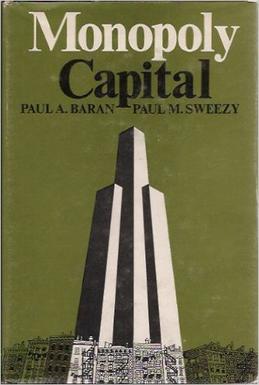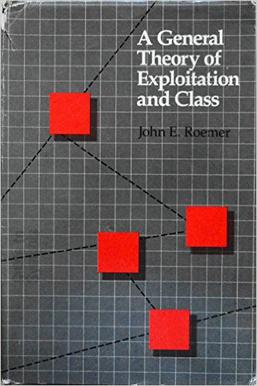Related Research Articles
Capitalism is an economic system based on the private ownership of the means of production and their operation for profit. Central characteristics of capitalism include capital accumulation, competitive markets, price systems, private property, property rights recognition, voluntary exchange, and wage labor. In a market economy, decision-making and investments are determined by owners of wealth, property, or ability to maneuver capital or production ability in capital and financial markets—whereas prices and the distribution of goods and services are mainly determined by competition in goods and services markets.

Anti-capitalism is a political ideology and movement encompassing a variety of attitudes and ideas that oppose capitalism. In this sense, anti-capitalists are those who wish to replace capitalism with another type of economic system, such as socialism or communism.

Wage labour, usually referred to as paid work, paid employment, or paid labour, refers to the socioeconomic relationship between a worker and an employer in which the worker sells their labour power under a formal or informal employment contract. These transactions usually occur in a labour market where wages or salaries are market-determined.
Fictitious capital is a concept used by Karl Marx in his critique of political economy. It is introduced in chapter 25 of the third volume of Capital. Fictitious capital contrasts with what Marx calls "real capital", which is capital actually invested in physical means of production and workers, and "money capital", which is actual funds being held. The market value of fictitious capital assets varies according to the expected return or yield of those assets in the future, which Marx felt was only indirectly related to the growth of real production. Effectively, fictitious capital represents "accumulated claims, legal titles, to future production" and more specifically claims to the income generated by that production.
Post-capitalism is in part a hypothetical state in which the economic systems of the world can no longer be described as forms of capitalism. Various individuals and political ideologies have speculated on what would define such a world. According to classical Marxist and social evolutionary theories, post-capitalist societies may come about as a result of spontaneous evolution as capitalism becomes obsolete. Others propose models to intentionally replace capitalism, most notably socialism, communism, anarchism, nationalism and degrowth.

Criticism of capitalism is a critique of political economy that involves the rejection of, or dissatisfaction with the economic system of capitalism and its outcomes. Criticisms typically range from expressing disagreement with particular aspects or outcomes of capitalism to rejecting the principles of the capitalist system in its entirety.

Ellen Meiksins Wood was an American-Canadian Marxist political theorist and historian.

Monopoly Capital: An Essay on the American Economic and Social Order is a 1966 book by the Marxian economists Paul Sweezy and Paul A. Baran. It was published by Monthly Review Press. It made a major contribution to Marxian theory by shifting attention from the assumption of a competitive economy to the monopolistic economy associated with the giant corporations that dominate the modern accumulation process. Their work played a leading role in the intellectual development of the New Left in the 1960s and 1970s. As a review in the American Economic Review stated, it represented "the first serious attempt to extend Marx’s model of competitive capitalism to the new conditions of monopoly capitalism." It attracted renewed attention following the Great Recession.
Marxism is a method of socioeconomic analysis that originates in the works of 19th century German philosophers Karl Marx and Friedrich Engels. Marxism analyzes and critiques the development of class society and especially of capitalism as well as the role of class struggles in systemic, economic, social and political change. It frames capitalism through a paradigm of exploitation and analyzes class relations and social conflict using a materialist interpretation of historical development – materialist in the sense that the politics and ideas of an epoch are determined by the way in which material production is carried on.
According to the political theorist Alan Johnson, there has been a revival of serious interest in communism in the 21st century led by Slavoj Žižek and Alain Badiou.

A General Theory of Exploitation and Class is a 1982 book about the exploitation of labour and social class written by the economist and political scientist John Roemer. The book was first published in the United States by Harvard University Press.
In Marxist thought, a communist society or the communist system is the type of society and economic system postulated to emerge from technological advances in the productive forces, representing the ultimate goal of the political ideology of communism. A communist society is characterized by common ownership of the means of production with free access to the articles of consumption and is classless, stateless, and moneyless, implying the end of the exploitation of labour.

Erik Olin Wright was an American analytical Marxist sociologist at the University of Wisconsin–Madison, specializing in social stratification and in egalitarian alternative futures to capitalism. He was known for diverging from classical Marxism in his breakdown of the working class into subgroups of diversely held power and therefore varying degrees of class consciousness. Wright introduced novel concepts to adapt to this change of perspective including deep democracy and interstitial revolution.
Analytical Marxism is an academic school of Marxist theory which emerged in the late 1970s, largely prompted by G. A. Cohen's Karl Marx's Theory of History: A Defence (1978). In this book, Cohen drew on the Anglo–American tradition of analytic philosophy in an attempt to raise the standards of clarity and rigor within Marxist theory, which led to his distancing of Marxism from continental European philosophy. Analytical Marxism rejects much of the Hegelian and dialectical tradition associated with Marx's thought.
The socialist mode of production, or simply (Marxist) socialism or communism as Karl Marx and Friedrich Engels used the terms communism and socialism interchangeably, is a specific historical phase of economic development and its corresponding set of social relations that emerge from capitalism in the schema of historical materialism within Marxist theory. The Marxist definition of socialism is that of production for use-value, therefore the law of value no longer directs economic activity. Marxist production for use is coordinated through conscious economic planning. According to Marx, distribution of products is based on the principle of "to each according to his needs"; Soviet models often distributed products based on the principle of "to each according to his contribution". The social relations of socialism are characterized by the proletariat effectively controlling the means of production, either through cooperative enterprises or by public ownership or private artisanal tools and self-management. Surplus value goes to the working class and hence society as a whole.

Capital: A Critique of Political Economy, also known as Capital, is a foundational theoretical text in materialist philosophy and critique of political economy written by Karl Marx, published as three volumes in 1867, 1885, and 1894. The culmination of his life's work, the text contains Marx's analysis of capitalism, to which he sought to apply his theory of historical materialism "to lay bare the economic laws of modern society", following from classical political economists such as Adam Smith, Jean-Baptiste Say, David Ricardo and John Stuart Mill. The text's second and third volumes were completed from Marx's notes after his death and published by his colleague Friedrich Engels. Das Kapital is the most cited book in the social sciences published before 1950.

History and Class Consciousness: Studies in Marxist Dialectics is a 1923 book by the Hungarian philosopher György Lukács, in which the author re-emphasizes the philosopher Georg Wilhelm Friedrich Hegel's influence on the philosopher Karl Marx, analyzes the concept of "class consciousness," and attempts a philosophical justification of Bolshevism.
"To each according to his contribution" is a principle of distribution considered to be one of the defining features of socialism. It refers to an arrangement whereby individual compensation is representative of one's contribution to the social product in terms of effort, labor and productivity. This is in contrast to the method of distribution and compensation in capitalism, an economic and political system in which property owners can receive income by virtue of ownership irrespective of their contribution to the social product.
Interstitial revolution is a theoretical means of societal transformation through progressively and strategically enlarging spaces of social empowerment. Interstitial revolution builds on the concept of prefigurative politics which has a long history in anti-capitalist thinking, going back nearly two hundred years in the anarchist tradition. Prefigurativism is neatly summed up by the early twentieth century Constitution of the Industrial Workers of the World which declared: "By organizing industrially we are forming the structure of the new society within the old."

Real utopian sociology is an emancipatory social science created and practiced by Erik Olin Wright, a utopian studies scholar. The apparent contradiction in its name is intentional: this sociology seeks to find existing utopian projects and evaluate their potential to replace systems of domination, particularly as an anti-capitalism strategy. Simply put, real utopian sociology is the study of feasible utopian models for society and pathways to achieve them.
References
- ↑ Jonathan H. Turner (2006). Handbook of sociological theory. Springer. p. 465. ISBN 978-0-387-32458-6 . Retrieved 6 December 2011.
- ↑ Gregory Elliott; Social Text Collective (1998). Perry Anderson: the merciless laboratory of history. U of Minnesota Press. p. 298. ISBN 978-0-8166-2966-4 . Retrieved 6 December 2011.[ permanent dead link ]
- 1 2 3 Erik Olin Wright (14 June 2010). Envisioning real utopias. Verso. p. 89. ISBN 978-1-84467-618-7 . Retrieved 6 December 2011.[ permanent dead link ]
- 1 2 Erik Olin Wright (14 June 2010). Envisioning real utopias. Verso. p. 90. ISBN 978-1-84467-618-7 . Retrieved 6 December 2011.[ permanent dead link ]
- 1 2 3 4 5 6 Erik Olin Wright (14 June 2010). Envisioning real utopias. Verso. pp. 90–92. ISBN 978-1-84467-618-7 . Retrieved 6 December 2011.[ permanent dead link ]
- 1 2 Erik Olin Wright (14 June 2010). Envisioning real utopias. Verso. pp. 93–94. ISBN 978-1-84467-618-7 . Retrieved 6 December 2011.[ permanent dead link ]
- 1 2 Erik Olin Wright (14 June 2010). Envisioning real utopias. Verso. pp. 95–97. ISBN 978-1-84467-618-7 . Retrieved 6 December 2011.[ permanent dead link ]
- 1 2 Erik Olin Wright (14 June 2010). Envisioning real utopias. Verso. pp. 97–98. ISBN 978-1-84467-618-7 . Retrieved 6 December 2011.[ permanent dead link ]
- 1 2 Erik Olin Wright (14 June 2010). Envisioning real utopias. Verso. pp. 99–100. ISBN 978-1-84467-618-7 . Retrieved 6 December 2011.[ permanent dead link ]